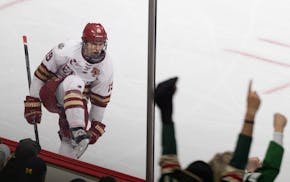The only surprise in Monday's sacking of Wild coach Todd Richards came in the timing. The usually deliberative Chuck Fletcher pulled the trigger more quickly than anticipated, which was probably a merciful gesture.
Richards' dismissal seemed inevitable, because this is how the pro-sports wheel turns. Failure requires a human sacrifice. Coaches, unless they have the cover of an enormous buyout clause, tend to be the easiest targets. So the management hands them the blindfold and the cigarette, utters the standard speech about having to make a painful but necessary change, and hopes that will satisfy the paying customers.
This time, it shouldn't. Richards bears some blame, but much of the responsibility for the Wild's sorry performance lies with a roster that simply doesn't have enough talent, particularly for the up-tempo style he tried to institute. And Fletcher, though handcuffed by the poor decisions of the previous regime, has to accept a share as well.
The Wild general manager took the first gamble of his tenure by hiring Richards, who had never been a head coach in the NHL and had spent only one season as an NHL assistant. His task: Take a limited amount of talent, jettison the franchise's defense-first philosophy in favor of a crowd-pleasing offensive style, and get back to the playoffs.
Given that tall order, it would have been more prudent to hire an experienced coach. Fletcher instead chose a rookie he expected to become the NHL's next rising star behind the bench. Richards clearly struggled to keep his players motivated and to handle sensitive egos and their agents (see: Martin Havlat), and rumors circulated that his authority was not respected by all. None of this is surprising for a first-time head coach, yet Richards got the hook after just two years of his three-year deal.
If Fletcher can convince a proven leader to take over -- and if owner Craig Leipold is willing to pay for one, on top of a payroll that's nearly maxed out -- maybe a new coach can conjure a few more victories out of this bunch. To expect anything more would be folly. Until the Wild adds some true top-line talent, it's going to be hard-pressed to move up in the Western Conference, and it risks alienating even more fans.
In his efforts to reshape the roster, Fletcher has been limited by the mess created by former GM Doug Risebrough, who gave away several draft picks, wasted others on poor choices and negotiated some overly generous contracts. That said, Fletcher hasn't gained much ground with the moves he's been able to make. Havlat led the team with 22 goals this season, but $30 million over six years is a steep price to pay. Matt Cullen scored 12 goals, was minus-14 and made $3.5 million. Cam Barker, acquired in a trade for popular local kid Nick Leddy, didn't come close to justifying his $3 million salary this season.
There is no easy fix here, because the $59 million the Wild is spending on mediocrity leaves little salary-cap room to add the goal scorers the team needs. And without injecting some excitement into the roster, the Wild can expect to see more empty seats at Xcel Energy Center.
As much as hockey is woven into this state's fabric, so is the insistence on getting value for one's hard-earned dollars. Minnesotans will not continue to pay premium prices to watch a bunch of plumbers miss the playoffs. They proved it this season, ending a 409-game sellout streak, and further defections will make it harder to fund the kind of payroll needed to make a run in the postseason.
Richards' firing doesn't solve any of those problems. It just means the Wild must start over again with a new coach, with no guarantee he will have any more horsepower. Fletcher's comments Monday indicated that he doesn't plan major changes; he said the team "needed a new voice to maximize production from this particular group of players."
After Jacques Lemaire left the Wild in 2009 -- when his defensive-minded style was declared too dull -- he predicted it would not be able to transform into an up-tempo team unless the roster changed, too. "Anyone can do offense, but go get the players, then," he said.
The Wild's brass ignores that advice at its own risk. A new coach, particularly a veteran, might help. But unless it is willing to bring in some new players, too, it's going to have a hard time convincing fans that its best days are anything more than increasingly dim memories.
Rachel Blount • rblount@startribune.com

Gable Steveson won't defend his Olympic gold medal in wrestling

Scorching hot before the PWHL's break, Minnesota returns Thursday at Montreal

Elk River's Bates again top American woman in Boston Marathon


